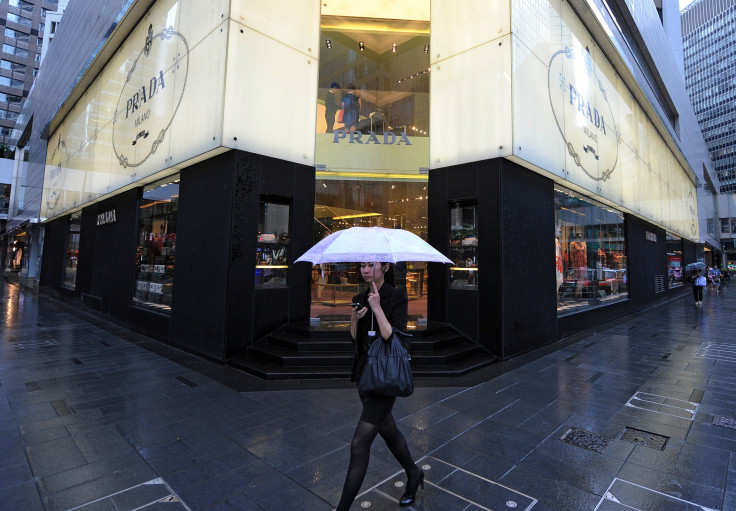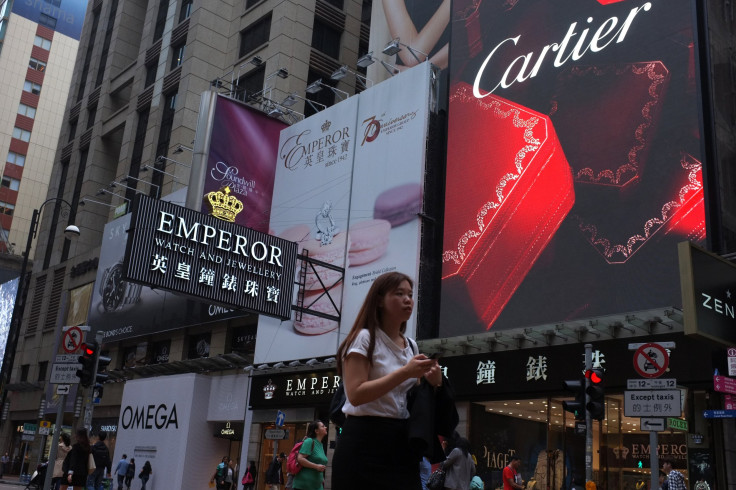China Slowdown: Hong Kong Luxury Retailers Feel Pinch As Mainlanders Travel Less Frequently, Spend Less

HONG KONG -- During lunchtime rush on a busy shopping day this week, the luxury boutiques that line one side of Hong Kong's Russell Street appeared to have misjudged their market. While the expensive designer watches and jewelry glistening in the windows went largely unnoticed by passing foot traffic, an open-air noodle shop on the opposite corner had customers lining up for service.
The scene is indicative of a problem facing the city's high-end luxury retailers. With mainland China's economy slowing and its stock markets in turmoil, tourists from China, whose 2013 luxury spending accounted for $102 billion, according to the Fortune Character Institute, are reigning back their spending on luxury goods.
The sales of jewelry, watches and clocks, and valuable gifts decreased by 10.4 percent in June 2015, the most recent month for which data are available, compared with the previous year, according to the Hong Kong Bureau of Statistics. In addition, the value of retail sales fell 4.4 percent in the second quarter of 2015 compared with the preceding quarter.
The number of mainland Chinese visiting Hong Kong has fallen this year, with June 2015 seeing a 1.9 percent drop on the same month last year, while March saw an 8.7 percent drop, according to official figures, cited by the Hong Kong Standard. Data from one Chinese tourism consultancy suggested that mainland visitor numbers had dropped by as much as 50 percent over 2014 traffic. New visa restrictions and negative sentiment caused by a series of high-profile anti-mainlander protests in Hong Kong were cited by outlets as possible factors contributing to the drop.

Key among the drivers changing consumer behavior, however, is the anti-corruption crackdown, which has become the centerpiece of President Xi Jinping's administration. China's government has cracked down on official largesse, in particular the giving of expensive gifts, and travel, both of which fueled Hong Kong's luxury consumer goods market.
The slowdown has so far been largely confined to the luxury sector, with shopping centers and mid-range stores continuing to see healthy growth, the Financial Times reports.
One expert said that, as a result of the crackdown, Chinese consumer habits have changed. “The Chinese before used to buy the most expensive jewelery, but after the government’s anticorruption policy, they have shifted to mid-range products,” Joe Lin, executive director of Hong Kong retail services at Commercial Real Estate Services, told Hong Kong business magazine. “We have seen a number of jewelers changing business models, where they will now offer more mid-range products in order to cope with changing consumer habits," he added.
The drop in demand for high-end consumer goods has caused many of the city's retailers, some of whom until recently paid the highest rents in the world, to begin demanding rent decreases from city landlords, something that would have been unthinkable this time last year.
Local jewelry retailer Chow Tai Fook recently succeeded in securing an almost 40 percent reduction in the rent it pays for one of its premium stores and Kering, owner of the Gucci brand, has warned that it may close some of its shops in Hong Kong if rental costs don’t come down, Bloomberg reported.
Hong Kong is not the only Chinese Special Administrative Region to be feeling the pinch. Casino hub Macau has seen VIP gaming revenue fall through the floor in the last 18 months, and now hopes to reinvent itself as a mass-market tourist destination.
© Copyright IBTimes 2024. All rights reserved.






















